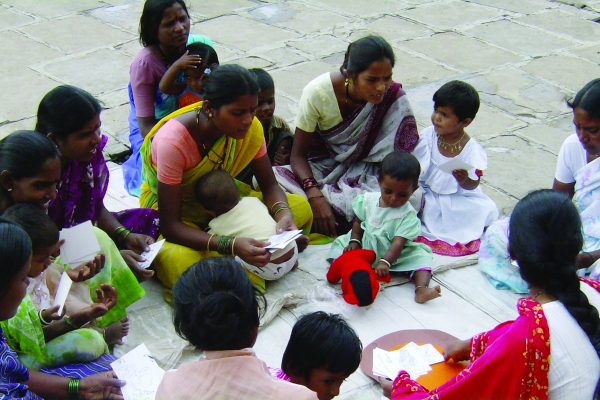Action Research Project for Home-based Delivery of Parent/Caregiver Education for Holistic Early child Care
Implementing the Adapted Caregiver Education Programmes and Assessing Impact
Local women were identified as ‘communicators’ in the research villages. ICDS anganwadi workers from several neighbouring villages also served as communicators.

The CLR trained these women to deliver the adapted curriculum through monthly education sessions for caregivers in their own communities, followed by effective home visits. Baseline and Endline surveys were conducted. Activities for wider community outreach were also facilitated by CLR.
Rapid Appraisal and Baseline Survey
A New Strategy
Organising a ‘Child Care Day’ in each Village
Interactive poster exhibitions developed by CLR in Marathi were held as part of ‘Child Care Days’ in the villages where the research project was being implemented. All activities organized by us in collaboration with ICDS staff during these days were targeted specifically at male caregivers, and also served to heighten general community awareness about good child care practices. The exhibitions generated a lot of interest among the visitors.
Discussion sessions with male caregivers were also held, while the toy-making corner for parents, and water-play corner for toddlers, turned out to be major attractions during the event.
Assessing the Impact of the Caregiver Education Programme
Findings
- Caregivers reported significant increase in their knowledge of ways to interact with young children in a stimulating manner. Although awareness of issues related to child health, nutrition, and pre-natal care increased among caregivers, the principal change was related to psychosocial care.
- Caregivers reported changes in actual practices related to psychosocial stimulation of children, and the recognition of noticeable developmental changes following their efforts. Most importantly, they were able to distinguish between proactive and on-demand stimulation, and the benefits of the former.
- While knowledge and practices of all aspects of holistic caregiving had increased, caregiving behaviours were sometimes constrained by social structures, culture, gender roles, incompatibility of opinions between different caregivers in the same family, availability of resources, and other factors.


EXAMPLES OF PROJECTS - Birth-3 Years
Building Capacity within NGOs to Promote Early Childhood Care and Development: Project with P.R.I.D.E. in Raigad District, Maharashtra
Social Work and Research Centre (SWRC), Tilonia, Rajasthan
Sajag - A Caregiver Education Project for Promoting Holistic Home-Based Child Care in Rajnandgaon Block, Chhattisgarh
